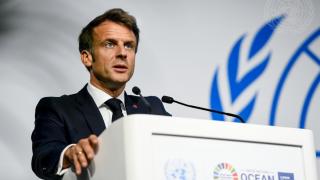March 16—French President Emmanuel Macron chose the tenth anniversary of Crimea’s March 16, 2014 vote to reunify with Russia—with an overwhelming 96.8% of votes cast—to proclaim that there will be no lasting peace in the Ukraine-Russia war unless and until Crimea is handed over to Ukraine. He might just as well have announced that, henceforth, all falling snow will be black. Russian Foreign Minister Sergey Lavrov responded simply: “The issue of the affiliation of Crimea and Sevastopol is closed. The peninsula is an integral part of Russia.”
Over recent weeks, Macron has repeatedly proposed that NATO troops be sent to Ukraine to directly do battle with Russia—a suicidal suggestion not received favorably by marginally saner leaders in Europe, such as German Chancellor Olaf Scholz. So on March 14, on the eve of a testy meeting with Scholz and Polish Prime Minister Donald Tusk, Macron told a French television interviewer that people should stop trying to “set too many limits with words. Two years ago we said we would never send tanks. Then we did. Two years ago we said we would never send medium-range missiles. Then we did.”
But don’t blame Macron for the insanity of the policy of seeking to destroy Russia at all costs, if need be by a direct military confrontation between NATO and Russia—it’s hardly original to him. U.S. Secretary of Defense Lloyd Austin, for example, recently remarked that if Ukraine is lost, NATO itself would soon be at war with Russia.
In response, President Putin has repeatedly explained that Russian military doctrine permits the use of thermonuclear weapons only if Russia is first attacked with nuclear weapons or if the very existence of the nation is threatened by other means—so don’t go there, he advises the Western Establishment.
But go there they will. The policy of obsessively driving for war arises from the desperation of a bankrupt trans-Atlantic financial system which has irrevocably turned to Schachtian economics to preserve both their $2 quadrillion financial bubble, and to try to militarily maintain their political dominance over a crumbling empire.
An insightful op-ed in the March 15 RT by Turkish historian Dr. Tarik Cyril Amar recognizes that not all voices in the West share that insane outlook. “Western elites are split between ‘pragmatists’ and ’extremists,” he wrote. “The pragmatists are as Russophobic and strategically misguided as the extremists, but they do shy away from World War Three. Yet these pragmatists, who seek to resist hard-core escalationists and rein in at least high-risk gamblers … share the same delusional narrative with the extremists.”
Although Amar fails to deal with the economic underpinnings of that deadly delusion, he correctly concludes: “We are at a potential breaking-point, a crisis of that long-term trajectory. If the pragmatists in EU/NATO-Europe really want to contain the extremists, who play with triggering an open war between Russia and NATO that would devastate at least Europe, then they must now come clean and, finally, abandon the common, ideological, and entirely unrealistic narrative about an existential threat from Moscow.”
Schiller Institute founder Helga Zepp-LaRouche went beyond descriptions of the crisis, and provided an actual policy solution in her closing remarks to the 41st consecutive weekly meeting of the International Peace Coalition on March 15:
“I think the world is in such an advanced state of crisis that you cannot hope to remedy all of them one by one, if you don’t change the underlying axioms—which is geopolitics and the wrong idea that a group of nations has the right to impose their interests against another group of nations. The idea of geopolitics has caused two world wars in the 20th Century, and we are about to see the final world war if we don’t change their thinking.
“That’s why we need this new international security and development architecture, because it throws out the idea of geopolitics by putting the idea of the one humanity first. A new architecture has to take into account the interests of every single country on the planet, because the history of the Peace of Westphalia, of the Versailles Treaty, and other examples demonstrate that if you don’t take into account the interests of everybody, it is just a step to the next war.”
An elaborated application of that approach to the genocide in Gaza and the broader war in Southwest Asia, will be presented at the upcoming April 13 international conference sponsored by the Schiller Institute: “The Oasis Plan: The LaRouche Solution for Peace Through Development Between Israel and Palestine and for All of Southwest Asia.” Make sure you register here.






